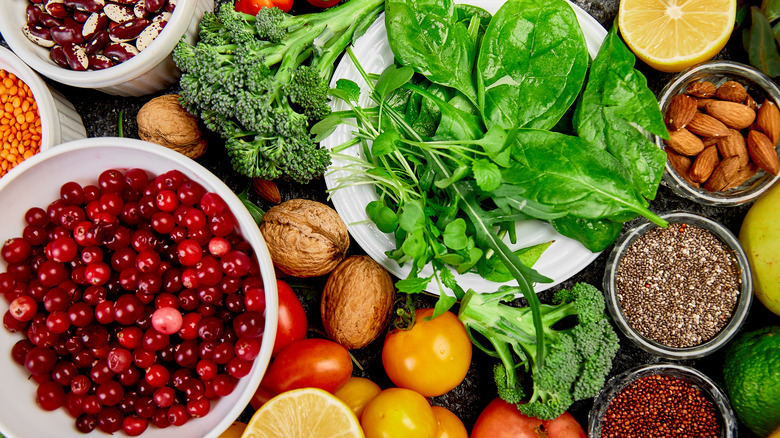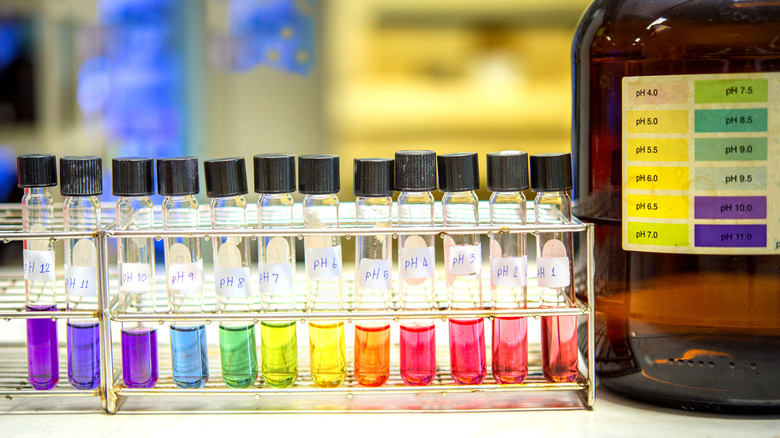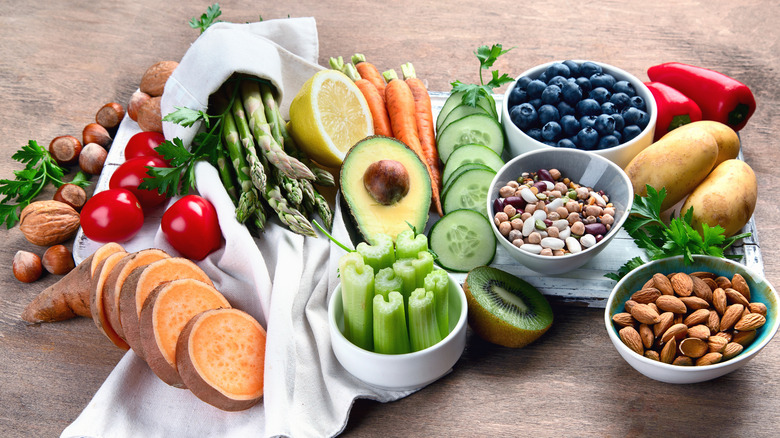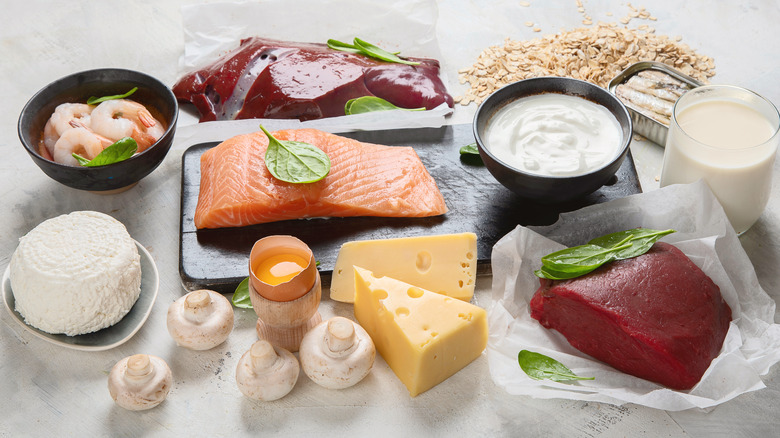Everything You Need To Know About The Alkaline Diet
The alkaline diet claims to lower your blood's acidity levels (also known as pH levels) by selectively eating and avoiding specific foods. The pH scale is a unit of measure for the acidity or alkalinity of a substance, and it ranges from 0 to 14 (via Healthline). When something has a pH under 7, it means it is acidic. In contrast, a pH over 7 means something is alkaline or basic, whereas a pH of 7 indicates that a substance or thing is neutral, which is the case for pure water.
According to a study published in the Journal of Environmental and Public Health, different parts of your body have different pH levels to serve specific purposes. For example, your skin, vagina, and stomach have lower or acid pH levels to protect or limit microbe overgrowth and break down foods, respectively. On the contrary, bile and pancreatic fluids have higher or basic pH levels that neutralize stomach acids and aid digestion. When it comes to your blood, it should have a pH between 7.35 and 7.45, meaning that it is slightly acidic.
Acidosis is a condition when the pH of your bodily fluids becomes too acidic, which can be detrimental to your health (per Livestrong). Proponents of the alkaline diet state that modifying your food intake can alkalize your blood to counter acidosis and prevent the onset of chronic diseases. This article will tell you whether the alkaline diet is based on facts or if it's just another fad.
It's a type of vegan diet that aims to lower your blood's pH levels
The alkaline diet is based on the notion that diet composition influences your body's acidity level, which derives from the concept of dietary acid load (DAL). According to an analysis published in The International Journal of Environmental Research and Public Health, a diet rich in sulfur-containing amino acids (which are found in animal-based proteins) promotes a high DAL, whereas a diet rich in potassium and its byproducts (which are present in plant-based foods) leads to a low DAL. Per the analysis, an imbalance in acidifying versus alkalizing foods — a.k.a animal versus plant-based foods — leads to a high DAL, which has been linked to an increased risk of chronic diseases. Therefore, the diet proposes a vegan lifestyle to keep your body from becoming too acidic.
However, as explained by a study published in the Journal of Environmental and Public Health, your body's pH balance (also known as acid-base homeostasis) is a tightly regulated process that allows it to function correctly, and your lungs and kidneys are the organs in charge of keeping said balance. While the study confirms that foods have a positive or negative acid load, it also states that your kidneys excrete the extra acid through your urine depending on your body's need to balance its internal pH. Furthermore, the study ensures that while high-protein diets lead to changes in urinary pH, they barely modify blood pH levels.
Foods to eat while on the alkaline diet
According to a study published in The International Journal of Environmental Research and Public Health, vegan diets help reduce the acidic burden that leads to an increased dietary acid load (DAL). Unlike animal-based and vegetarian diets (which could also include eggs and dairy), vegan diets are characterized by a considerably higher intake of fruit, vegetables, beans, and other legumes that provide plant-based proteins and have an alkalizing effect. In addition, they're also rich in potassium, which promotes the production of alkaline or basic compounds.
Nevertheless, according to the Alkaline Diet's website, not all plant-based foods are equal when it comes to their alkalizing properties. Per their food lists, fruits, vegetables, and legumes can range from highly or mildly alkaline to highly or mildly acidic. As you can imagine, they encourage choosing those on the alkalizing side.
For instance, when it comes to fruits, some highly alkaline ones are figs, avocados, kiwi, lemons, and limes. Bananas, apples, apricots, oranges, and peaches, to mention a few, are considered alkaline. Similarly, alkaline grains and legumes include buckwheat, quinoa, wild rice, amaranth, lentils, and green, navy, soy, red, pinto, and mung beans. In addition, all fresh vegetables and roots range from mildly to highly alkaline. Lastly, some mildly alkaline nuts, seeds, and oils include almonds, pine nuts, and sunflower; fennel, flax, and pumpkin seeds; and avocado, coconut, olive, sesame, and flax seed oils.
Foods to avoid in the alkaline diet
Generally speaking, meat, cheese, eggs, fish, and certain grains such as oats and processed wheat-based products are considered acidic foods, per a study published in The International Journal of Environmental Research and Public Health. The study attributes their acidifying effect to their sulfur-containing amino acids — namely methionine, cysteine, and homocysteine — because they release sulfate when digested, which significantly influences the body's acid load. In addition, an analysis published in The International Journal of Environmental Research and Public Health classifies Western diets as largely acid-inducing due to their excessive intake of highly processed and refined foods, added sugars, salt, and fat, and protein from animal products.
Therefore, the alkaline diet bans all animal-based foods and products and highly processed foods in general, such as baked goods, sweets, and alcoholic beverages. However, you might be surprised to hear that some plant-based foods are also classified as acidic per the food lists on the Alkaline Diet's website. For example, blueberries and cherries are considered mildly acidic fruits. As for legumes, chickpeas are also mildly acidic, while black and kidney beans are considered acidic. In addition, canned, frozen, pickled, and cooked vegetables are also regarded as acidic for being processed food products, along with peanuts, pistachios, chestnuts, and pecans. Lastly, mildly acidic oils include sunflower, canola, corn, and cod liver oils.
It may lead to short-term weight loss
Obesity is a common yet serious condition associated with an increased risk of heart disease, diabetes, and cancer, affecting roughly 42% of Americans as of 2020, according to the Centers for Disease Control and Prevention (CDC). While the alkaline diet is not described as a weight-loss diet, it may help you lose weight in the short term due to its dietary modifications. According to a 2019 study published in the journal Cell Metabolism, ultra-processed foods can lead to obesity because they make it easier to consume large amounts of calories per serving. The study explains that this is because processed foods tend to be energetically dense, meaning that they're high in calories due to their high fat, sugar, and salt content compared to unprocessed foods.
The study also points out how the rise in obesity and its related health complications has happened alongside the rise of a highly industrialized food system that delivers ultra-processed foods for the most part. In fact, it states that the majority of calories consumed by Americans today come from different forms of processed foods, increasing overall daily calorie intake by over 500 calories when compared to unprocessed diets. In contrast, vegan diets (such as the alkaline diet) are characterized by a low energy intake thanks to their high fiber content, which leads to longer feelings of fullness, reducing your daily food intake and, thus, helping you lose weight, per a 2021 study published in Nutrients.
It may lower the risk of diabetes
Diabetes is a disease in which your body either has trouble producing the hormone insulin or can't use it effectively. Since insulin is the hormone in charge of moving sugar into your cells to be used as fuel, diabetes is characterized by constantly having high blood sugar levels (per Healthline). Nevertheless, the alkaline diet has the potential to lower the risk of diabetes and control your blood sugar levels due to the effect of dietary acid load (DAL) on insulin resistance and the benefit of vegan diets for the management of the disease.
On the one hand, a study published in the journal Diabetologia explains that an acid/base imbalance can lead to insulin resistance, which is when your tissues don't respond to insulin (meaning that your body has to produce more for it to do its job). In addition, the study says that people with acid urinary profiles tend to have a higher risk of type 2 diabetes than those with alkaline urinary profiles. On the other hand, a study published in Nutrients shows that vegan diets can help reduce blood sugar levels by up to 28% compared to the 12% found in animal-based diets. In fact, this study suggests that vegan diets are also associated with a more significant reduction in the dosage of diabetic medication. Therefore, while an alkaline diet may not necessarily change your blood's pH levels, it can still be beneficial for blood sugar control.
It is rich in fresh produce
Being a vegan type of eating pattern, the alkaline diet promotes a high fruit and vegetable intake, which is associated with a number of additional health benefits regardless of their effect on your body's acidity levels. A review published in the Iranian Journal of Public Health explains that consuming more fresh produce leads to a higher antioxidant intake. Antioxidants are the compounds responsible for the bright colors of fruits and vegetables. They also help scavenge free radicals, which are harmful compounds that, in excess, can lead to the onset of multiple chronic diseases. Furthermore, the review also points out that a higher fruit and vegetable intake promotes a higher dietary fiber consumption.
According to an article published in Nutrition Reviews, a fiber-rich diet has the potential to reduce the risk of heart disease, diabetes, and obesity, as well as improve your digestive and immune health. However, it states that most people in the U.S. consume less than 50% of the recommended amount of fiber per day. Lastly, the alkaline diet can also have a positive environmental impact. Per a 2021 review published in Nutrients, plant-based diets have lower energy, soil, and water consumption and greenhouse gas (GHG) emissions.
It may benefit people with chronic kidney disease
Chronic kidney disease (CKD) is a progressive condition that slowly destroys your kidneys (per Healthline). Since your kidneys are one of the two organs in charge of keeping your body's acid/base balance, research suggests that a diet low in dietary acid load (DAL), such as the alkaline diet, might benefit people with CKD.
According to a review published in the journal Advances in Chronic Kidney Disease, a direct relationship exists between a higher DAL and CKD progression, leading to a decline in kidney function. Thus, the review suggests that reducing your body's acidity through the intake of supplements or fruits and vegetables may help reduce markers of kidney injury and slow the need for dialysis in people with late-stage CKD.
Nevertheless, per one review published in the Journal of Renal Nutrition, an alkaline diet is not the only dietary pattern that leads to the same promising results. While the review supports that a reduction in animal-based proteins leads to higher levels of bicarbonate in the body (a key alkalizing compound), it determined that restricting them to about 50% of total protein intake while allowing for fruit, vegetables, bread, and grains to be consumed freely also slowed the progression of the disease while maintaining a healthy nutritional status.
It may reduce cancer risk, although evidence is conflicting
According to a study published in Nutrition and Metabolism, there is a known relationship between diet and cancer, with acidity being a determining factor. Per the study, an acidic environment in the space that surrounds your cells promotes the invasive characteristic of cancer cells, which facilitates their spread (also known as metastasis). For that reason, health organizations such as the American Institute for Cancer Research (AICR) recommend consuming a diet rich in cancer-fighting foods while limiting the intake of cancer-promoting ones. The AICR states that while no single food can protect against cancer, following an eating pattern high in plant-based foods with a reduced intake of red meat and processed foods — which highly resembles the alkaline diet — may offer a protective effect.
Yet, despite the link between diet, acidity, and cancer, the previous study also shares conflicting evidence. For instance, it states that the acidity present in the space surrounding cancer cells is mainly produced by the same tumor cells, which is different from diet-induced acidity. Additionally, it suggests that there's not enough evidence to confirm that dietary acidosis alone is enough to increase cancer risk, but that it may be one among many other contributing factors that lead to the disease.
It restricts multiple nutritious food groups
The alkaline diet keeps you from consuming nutritious plant-based foods that would otherwise be regular items on a conventional vegan menu, such as whole grains and fermented foods (per the Alkaline Diet's website). These food groups are associated with a wide range of health benefits due to their fiber and probiotic content.
Per a 2017 review published in The Journal of Chiropractic Medicine, increasing your intake of whole grains — including whole wheat, dark bread, brown rice, oats, barley, and rye — can significantly reduce your risk of type 2 diabetes. This is because their high fiber content delays the rate at which your stomach empties its contents, meaning that your food is digested more slowly, preventing a spike in your blood sugar levels. Furthermore, consuming two and a half servings of whole grains per day can also reduce the risk of heart disease because, once more, their fiber helps lower blood cholesterol levels. Lastly, the review explains that plant compounds in whole grains can also help lower blood pressure.
As for fermented foods, such as kimchi, sauerkraut, or kombucha, they're a group of foods known for being rich in probiotics — or gut-healthy bacteria — which have been linked to numerous health benefits (via Healthline). For example, according to Healthline, kimchi may improve blood sugar and cholesterol levels, sauerkraut is rich in eye-protecting compounds, and kombucha may even have cancer-fighting properties.
It may reduce the risk of heart disease, but not necessarily due to its alkalinizing effect
Proponents of the alkaline diet claim that you'll reduce the risk of heart disease by choosing alkalizing foods. However, scientific evidence seems to be mixed.
On the one hand, according to a study published in Cardiovascular Diabetology, diets with a high dietary acid load (DAL) — a.k.a acidic diets — increase the risk of heart disease regardless of the presence of additional risk factors, such as insulin resistance, obesity, and lack of exercise. The study determined that it could be due to a link between DAL and blood pressure. However, another study in 2,241 people published in The American Journal of Clinical Nutrition found no association between acidic diets and high blood pressure.
Nevertheless, regardless of its effect on your body's pH levels, the alkaline diet can still reduce the risk of heart disease due to the higher intake of fruits and veggies and the reduced consumption of red meat and sugar- and fat-rich foods. Per a study published in the journal Cardiology Research and Practice, following an eating pattern with those characteristics can reduce your inflammation levels and significantly improve your heart health. The study links the beneficial effect to the antioxidant and fiber content of plant-based foods.
It may improve bone health, but evidence is mixed
According to a study published in the journal Nefrologia, an acid-inducing diet can have detrimental effects on bone health. The study explains that low pH levels in your body reduce the activity of osteoblasts, bone cells that promote bone formation. Plus, it also stimulates the activity of other bone cells called osteoclasts, which break down bone tissue to release calcium and phosphorus into your bloodstream, acting as a buffer in an attempt to regulate pH levels. By affecting both types of bone cells, the study says that an acidic diet can reduce your bone mineral density (BMD), a risk factor for osteoporosis. This disease increases the risk of fractures due to fragile bones, per the Centers for Disease Control and Prevention (CDC).
That said, a review published in The Journal of Bone and Mineral Research explains that even if diet-induced acidity increases urinary acid and calcium excretion, there is no link between acid excretion and an alteration in markers of bone metabolism — meaning that changes in urine calcium don't reflect calcium balance and that a high dietary acid load (DAL) does not lead to bone mineral loss or promotes osteoporosis. In fact, the review concludes that there are no scientific grounds to promote the alkaline diet to improve bone health by preventing calcium loss.
It is highly restrictive and not supported by science
While traditional vegan diets can be very healthy, they naturally lack certain nutrients that plant-based foods either don't provide or provide too little of, such as vitamins D, B12, and certain omega-3 fatty acids (via Healthline). Given that the alkaline diet is a far more restricted version of a regular vegan diet, you could be at a higher risk of nutrient deficiency. For example, vegan-friendly sources of vitamin B12 include fortified soy products, bread, and breakfast cereals. However, since they are all processed foods, they are banned from the alkaline diet.
Furthermore, despite its potential health benefits, the alkaline diet is highly controversial among the scientific community, who argue that the diet is unnecessarily restrictive and lacks scientific background. For instance, a review published in the journal Advances in Chronic Kidney Disease explains that replacing ultra-processed foods with a higher intake of fruits and vegetables may significantly reduce acidity levels without the need for such an excessive protein restriction. Similarly, a study published in Nutrition and Metabolism says that while animal-based protein does increase acidity, restricting its intake isn't a recommended dietary strategy when looking to improve the body's acid-base balance. And last but not least, as stated by the Cleveland Clinic, the alkaline diet may change your urine's pH, but not your blood's pH.













